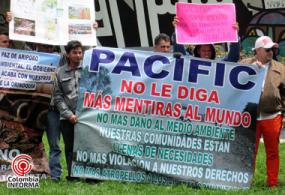The Unión Sindical Obrera (USO) began a serie of strikes and protests this monday in all regions of the country, threatening to call for a national strike in the oil sector.
Last Friday, February 27, the National Board of Representatives of the USO concluded their meeting with a declaration that called for the workers and affiliated members to mobilize, proposing the possibility of a national strike. This monday workers responded to the call, initiating actions of mobilizations and strikes in various companies on a regional level.
Edgar Mojica, part of the USO’s National Commission for Human Rights and Peace stated, “The mobilizations have already began, they are staggered mobilizations that will be building up, the biggest that we have planned is in the Colombian Petroleum Institute (ICP) in Bucaramanga, where the workers declared that they are on strike as of this monday. In all of the regions there are regulation operations, rallies, protests, and there is a national mobilization planned for next week. According to the conditions, the union will assess if the intensity will increase.
The USO has made a call for mobilizations in response to and in rejection to the administrative policies implemented by Ecopetrol and other petroleum companies, whom according to the USO, have been using the petroleum crisis to make budget cuts and cancel contracts. They also criticize the National Development Plan proposed by the president Juan Manuel Santos because it imposes and increases the extractivist model in Colombia and opens the doors of the country to transnational petroleum companies.
“In this moment, the workers are being laid off because the petroleum companies have begun to cancel contracts and projects. There are two major examples; the master plans of investing in the modernization of the refinery in Barrancabermeja and of the Colombian Petroleum Institute in Bucaramanga were cancelled, and the contracts with the companies who developed the pilot plans and whose laboratory would have created 600 jobs were cancelled,” commented Mojica.
Meanwhile, the national government led by the Minister of Work, Luis Eduardo Garzón, ex-leftist union leader and ex-mayor of Bogotá, has stated to the medias that he will seek to avoid the mobilizations and strike. Garzón said, “It does not help generate employment, the president has demonstrated respect towards the protests, but with the situation that is happening to the sector, he believes it is not an opportune moment for a strike.”
Other Proposal from the Discussion
The USO also discussed the proposals that they have made about the debate on the management of petroleum and the extractivist economic model that has been implemented in the country. They have put forward the installation of a national discussion space on the topic, “This is so that the society in a sovereign manner can discuss what to do with the management of these resources, such as who extracts them, how they are extracted, and for what. On this subject, the union has been advancing on a national level the proposal for the Organic Hydrocarbon Law.”
For now, the minister Garzón has urged a meeting with the board of the USO to revise and stop the mobilization, while the workers prepare to take on larger protests on a national level.
